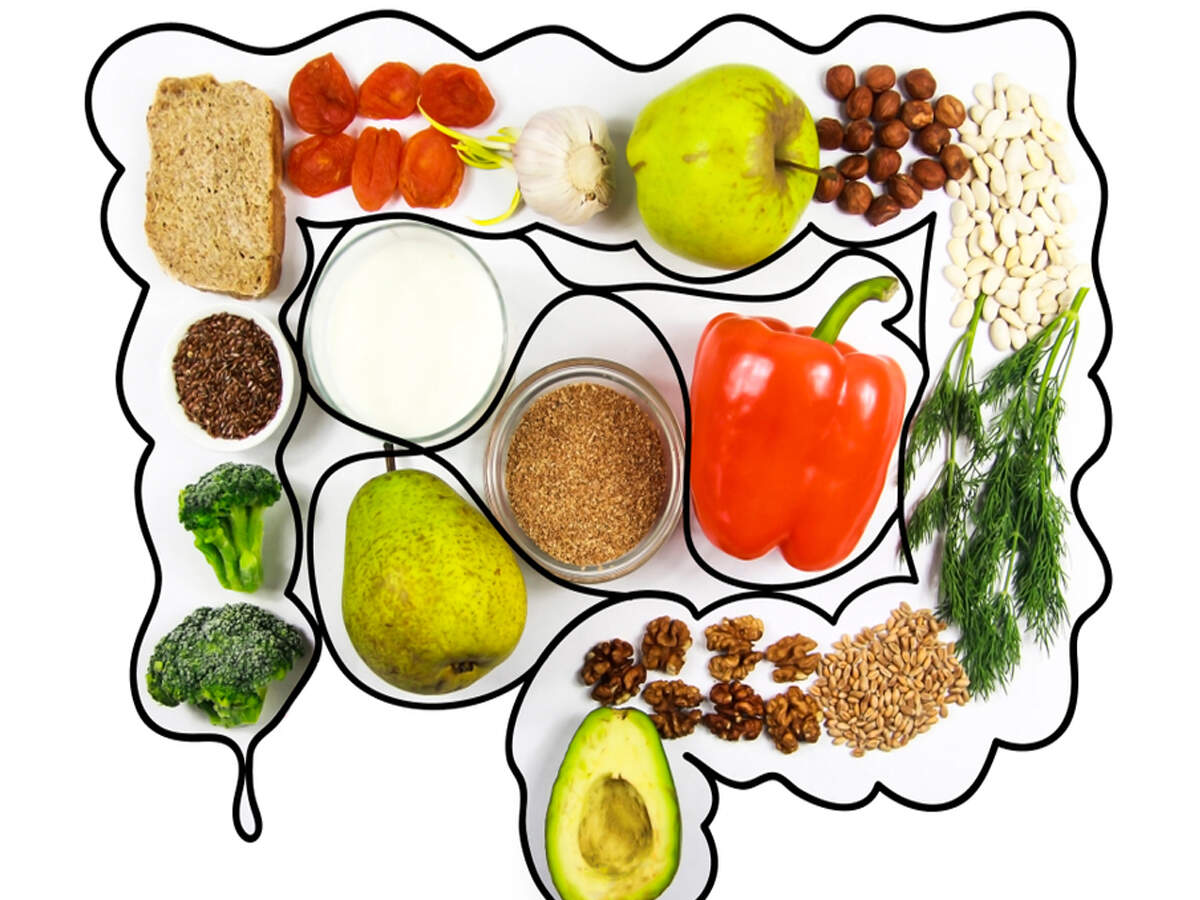Best Natural Ways to Improve Digestion
Occasionally, everyone has digestive symptoms such as bloating, gas, heartburn, nausea, constipation, or Diarrhoea.
These symptoms, on the other hand, might create severe disruptions in your life if they occur regularly.
Fortunately, you can improve your gut health by changing your food and lifestyle.
Here are 11 natural techniques to enhance your digestion that are backed by research.

- Consume Real Food
The normal Western diet, which is heavy in refined carbohydrates, saturated fat, and food additives, has been associated with a higher risk of digestive issues.
Food additives such as glucose, salt, and other chemicals have been linked to increased gut inflammation, which can lead to a disease known as leaky gut.
Many processed foods include trans fats.
They’re notorious for their detrimental effects on heart health, but they’ve also been linked to an increased risk of ulcerative colitis, an inflammatory bowel illness.
Furthermore, artificial sweeteners are commonly included in processed meals such as low-calorie beverages and ice creams, which can create stomach issues.
In one research, 70 percent of participants who ate 50 grams of the artificial sweetener xylitol had bloating and diarrhea, while 60 percent of persons who ate 75 grams of the sweetener erythritol experienced the same symptoms.
Artificial sweeteners may also increase the quantity of dangerous intestinal bacteria, according to studies.
Irritable bowel syndrome (IBS) and irritable bowel illnesses including ulcerative colitis and Crohn’s disease have been related to gut flora imbalances.
Fortunately, research shows that nutrient-rich meals can help prevent digestive disorders.
Summary Processed food diets have been related to an increased risk of digestive problems. A diet reduced in food additives, trans fats, and artificial sweeteners may help you digest food more easily and prevent you from digestive problems.
- Take in a lot of fiber
Fiber is well known for its digestive benefits.
Soluble fiber absorbs water and helps your stool bulk up. Insoluble fiber functions as a huge toothbrush, cleaning your digestive tract and keeping it moving.
Soluble fiber may be found in oat bran, legumes, nuts, and seeds, whereas insoluble fiber may be found in vegetables, whole grains, and wheat bran.
Ulcers, reflux, hemorrhoids, diverticulitis, and IBS have all been related to eating a high-fiber diet.
Prebiotics are a form of fiber that feeds the good bacteria in your stomach.
Fiber-rich diets have been demonstrated to lessen the risk of inflammatory bowel disease.
Prebiotics may be found in a variety of foods, including fruits, vegetables, and grains.
Summary A high-fiber diet encourages regular bowel motions and may help to prevent a variety of digestive problems.
Soluble and insoluble fiber, as well as prebiotics, are three typical forms of fiber.
- Increase the amount of healthy fats in your diet.
It’s possible that consuming adequate fat is necessary for good digestion.
Fat makes you feel full after a meal and is frequently required for adequate nutrition absorption.
Omega-3 fatty acids have also been found in trials to reduce the chance of acquiring inflammatory bowel illnesses like ulcerative colitis.
Flaxseeds, chia seeds, nuts (particularly walnuts), and fatty fish like salmon, mackerel, and sardines are all high in omega-3 fatty acids.
Summary
Some fat-soluble nutrients are better absorbed when you eat enough fat.
Omega-3 fatty acids also help to decrease inflammation, which may help to avoid inflammatory bowel illnesses.
- Keep yourself hydrated.
Constipation is frequently caused by a lack of fluid consumption.
To avoid constipation, experts recommend consuming 50–66 ounces (1.5–2 liters) of non-caffeinated water each day.
If you live in a hot area or engage in rigorous exercise, you may require more.
In addition to water, herbal teas and other non-caffeinated beverages like seltzer water can help you satisfy your fluid requirements.
Fruits and vegetables rich in water, such as cucumber, zucchini, celery, tomatoes, melons, strawberries, grapefruit, and peaches, are another strategy to assist fulfill your fluid demands.
Summary Constipation is frequently caused by a lack of fluid consumption. Increase your water intake by drinking non-caffeinated drinks and eating high-water-content fruits and vegetables.
- Control Your Anxiety
Your digestive system might suffer as a result of stress.
It has been connected with stomach ulcers, diarrhea, constipation, and IBS.
Stress hormones have a direct impact on digestion.
Your body believes you don’t have time to relax and digest when it’s in fight-or-flight mode.
Blood and energy are directed away from your digestive system during times of stress.
Furthermore, your stomach and brain are intertwined, so whatever affects your brain may also influence your digestion.
People with IBS have been proven to benefit from stress management, meditation, and relaxation training.
Cognitive behavioral therapy, acupuncture, and yoga have all been shown to help with digestive issues in other research.
As a result, including stress management practices like deep belly breathing, meditation, or yoga into your daily routine may benefit not just your mind but also your digestion.
Summary Stress has been related to IBS, ulcers, constipation, and diarrhea due to its unfavorable effects on digestion. Stress reduction can help with stomach issues.
- Eat Mindfully
If you’re not paying attention, it’s simple to eat too much, too fast, which can cause bloating, gas, and indigestion.
The discipline of mindful eating entails paying attention to all elements of your food and eating experience.
Mindfulness has been found in studies to help patients with ulcerative colitis and IBS feel better.
To eat mindfully:
- Eat slowly.
- Focus on your food by turning off your TV and putting away your
phone. - Notice how your food looks on your plate and how it smells.
- Select each bite of food consciously.
- Pay attention to the texture, temperature and taste of your
food.
The process of digestion begins in the mouth.
Your teeth break down the meal into tiny bits, making it easier for the enzymes in your digestive tract to digest.
Reduced nutrition absorption has been linked to poor chewing.
When you chew your meal completely, your stomach works less to convert the solid meal into the liquid mixture that enters your small intestine.
When you chew, saliva is produced, and the longer you chew, the more saliva is produced.
Saliva aids in the digestion process by breaking down some of the carbohydrates and fats in your food in your mouth.
Saliva serves as fluid in your stomach, mixing with solid food to help it flow through your intestines easily.
When you chew your meal properly, you guarantee that you have enough saliva to aid digestion. This may aid in the prevention of indigestion and heartburn.
Furthermore, chewing has been demonstrated to lower stress levels, which may help with digestion.
- Get Exercise
One of the most effective strategies to enhance your digestion is to exercise regularly.
Food travels through your digestive system with the aid of gravity and exercise.
As a result, going for a stroll after a meal may help your body move things along.
Moderate activity, such as cycling and running, increased gastrointestinal transit time by approximately 30% in healthy persons, according to one research.
A daily exercise plan comprising 30 minutes of walking dramatically alleviated symptoms in persons with persistent constipation in another trial).
Furthermore, studies show that exercise can help with inflammatory bowel disease symptoms by having anti-inflammatory effects, such as lowering inflammatory molecules in the body.
- Slow down and pay attention to what your body is telling you.
It’s easy to overeat and feel gas, bloating, and indigestion if you don’t pay attention to your hunger and fullness signs.
It’s a widely held assumption that your brain takes 20 minutes to recognize that your stomach is full.
While there isn’t much strong research to back this up, hormones generated by your stomach in reaction to eating do take time to reach your brain.
As a result, one method to avoid frequent digestive disorders is to eat slowly and pay attention to how full you are becoming.
Emotional eating also has a bad influence on digestion. People who ate while they were stressed had more indigestion and bloating, according to one research.
Taking some time to relax before a meal might help with stomach issues.
- Get Rid of Your Bad Habits
You already know those harmful behaviors like smoking, binge drinking, and eating late at night is hazardous for your health.
They might be to blame for several common digestive problems.
Smoking
Acid reflux is rough twice as likely when you smoke.
In addition, studies have indicated that stopping smoking helps to alleviate these symptoms.
Stomach ulcers, higher surgeries in persons with ulcerative colitis, and gastrointestinal malignancies have all been linked to this poor habit.
If you have digestive problems and smoke cigarettes, you should consider stopping.
Alcohol
Alcohol can cause heartburn, acid reflux, and stomach ulcers by increasing acid production in the stomach.
The ingestion of too much alcohol has been connected to gastrointestinal hemorrhage.
Inflammatory bowel illness, leaky gut, and detrimental alterations in gut flora have all been linked to alcohol.
Reducing your alcohol consumption may aid digestion.
Some Foods that Help with Digestion
Yogurt includes probiotics, which can help with digestion by encouraging the growth of good bacteria in your intestines.
Apples include pectin, which aids with stool volume and transportation through the digestive tract. It may also help to reduce intestinal irritation.
The fiber content and antispasmodic ingredient in fennel can help with digestion by reducing some gastrointestinal symptoms.
Kefir’s special component, yeast, and bacteria-based “grains,” appears to aid digestion and reduce inflammation in the stomach.
Chia seeds’ fiber content can help with digestion by encouraging the growth of probiotic bacteria in your stomach and keeping you regular.
Papaya is high in papain, a powerful digestive enzyme that aids in the proper digestion of proteins. It might also help with IBS symptoms.
Whole grains, with their high fiber content, can help with digestion by bulking up your stool, relieving constipation, and nourishing your good gut flora.
Beetroot’s nutrients can help improve digestion by helping feed friendly gut bacteria and adding bulk to your stool.

